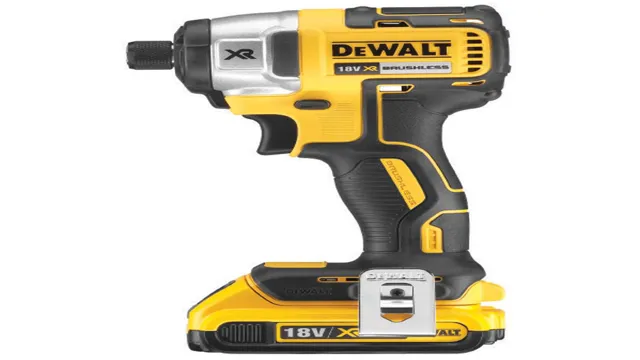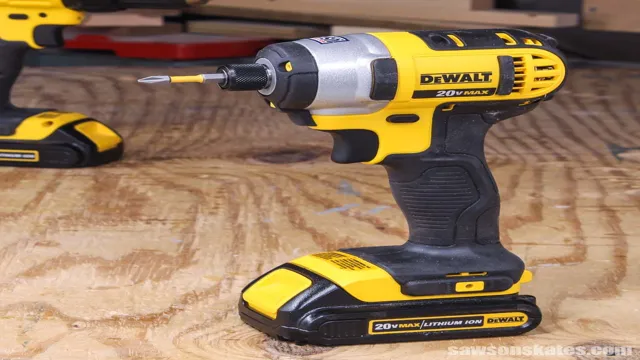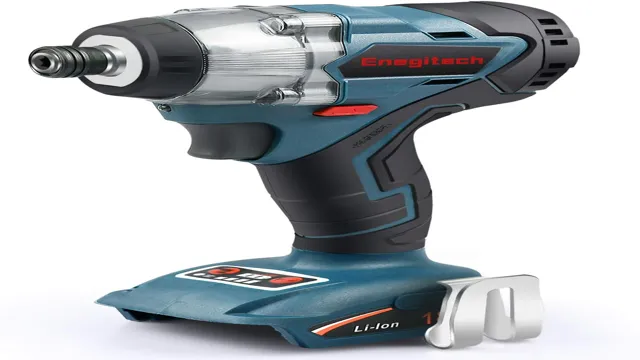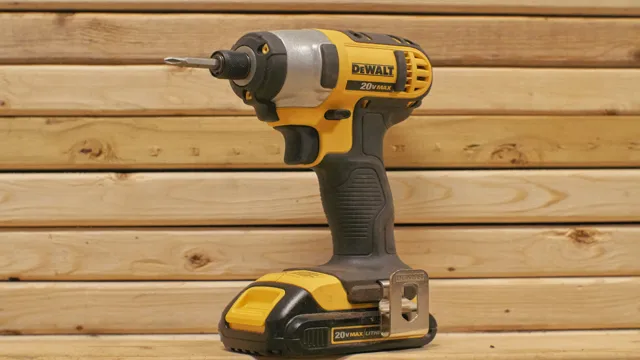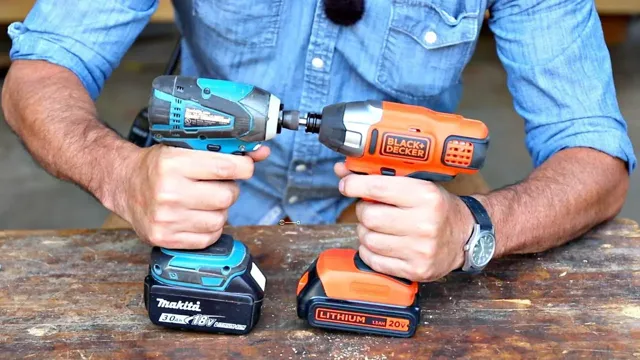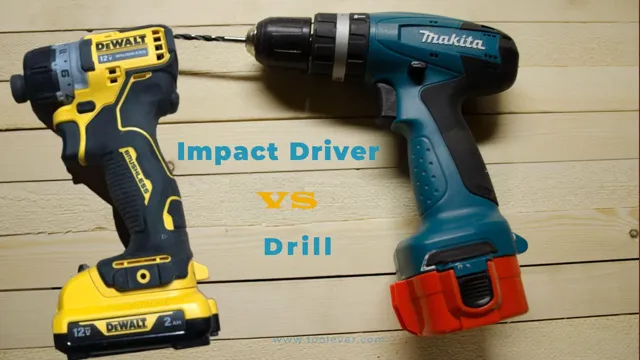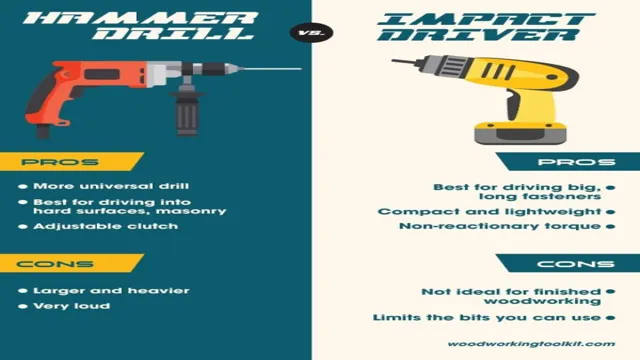Can You Drill Holes with an Impact Driver? Tips and Tricks to Master the Technique
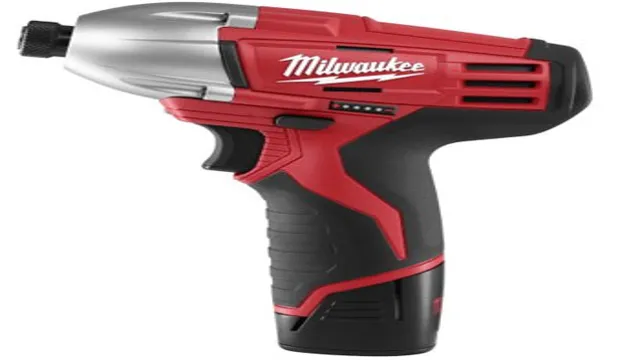
Have you ever been stuck in a home improvement project and wondered if your impact driver can handle drilling holes? This is a common question that DIY enthusiasts and professionals alike often ask themselves. Impact drivers are incredibly handy tools that can make quick work of driving screws and fasteners, but can they also be used to drill holes? The answer is yes, but it depends on the type of hole you are trying to make and the type of material you are working with. In this blog, we will explore the capabilities of impact drivers when it comes to drilling holes and discuss some tips and tricks for getting the job done effectively.
So, buckle up, and let’s dive in!
Understanding Impact Drivers
Many people wonder if an impact driver can be used to drill holes, and the answer is yes, but it depends on the size of the drill bit and the material you are drilling into. Impact drivers are typically designed for driving screws and fasteners into hard materials such as wood or metal, but they can also be used for drilling smaller holes. For larger holes, it is best to use a drill with the appropriate bit.
The impact driver’s strong rotational force can cause the smaller drill bits to break when trying to bore through harder materials. So if you need to drill small holes in softer materials such as drywall or plywood, an impact driver can be a versatile tool to add to your kit. But if you need to drill larger holes or into tougher materials, a drill will be a better option.
Always use the right tool for the job, and stay safe when drilling.
What is an Impact Driver?
An impact driver is a powerful tool that is used to drive screws into tough materials like wood and concrete. Unlike a regular drill, an impact driver uses a combination of rotational force and concussive blows to deliver maximum torque, making it ideal for tough tasks. Essentially, impact drivers work by delivering a burst of high-torque rotational force that is designed to drive screws into hard materials quickly and efficiently.
Think of it like a mini-jackhammer that is specifically designed for driving screws. What sets an impact driver apart from a regular drill is its ability to deliver forceful bursts of power without the user having to exert too much pressure themselves. This makes it an incredibly useful tool for those working in construction, woodworking or any task that requires lots of drilling and screwing.
Ultimately, if you’re looking for a powerful, reliable tool that can make your DIY job a breeze, then it’s worth investing in an impact driver!
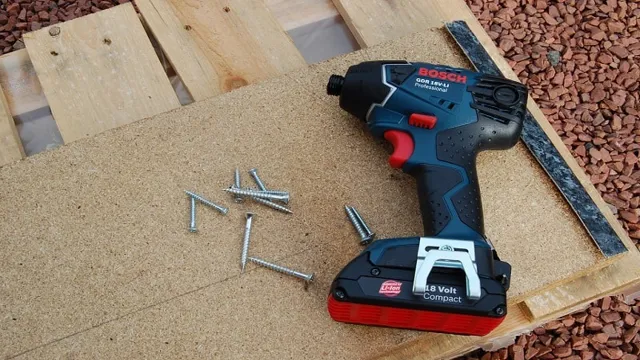
How Does an Impact Driver Work?
If you’re in the market for a new power tool, you may have come across impact drivers. But what are they, and how do they work? Unlike a traditional drill, which uses a constant rotational force to bore through wood or metal, an impact driver uses a combination of rotation and concussive force to drive screws and other fasteners home. This makes them ideal for heavy-duty tasks, particularly those involving dense or thick materials.
Inside, an impact driver features a special mechanism that hammers against the bit as it rotates, providing the extra oomph needed to power through even the toughest jobs. So whether you’re working on a construction site or just putting up shelves at home, an impact driver can be a valuable addition to your tool kit.
Drilling Holes with an Impact Driver
Yes, you can drill holes with an impact driver. While most people think of impact drivers as primarily for driving screws, they can also be used for drilling holes in certain materials. However, it’s important to note that impact drivers are not designed for drilling large or deep holes.
They work best for smaller holes in wood, plastic, and soft metals. It’s also important to choose the right type of drill bit for the material you’re drilling into, as well as to use proper safety gear like eye protection and earplugs. While a drill may be the better option for most drilling tasks, an impact driver can be a useful tool to have in your toolbox for those smaller jobs.
Types of Drill Bits That Can Be Used
Impact Driver, Drill Bits, Drilling Holes If you’re looking to drill holes with an impact driver, it’s important to ensure you have the right drill bit. There are several types of drill bits that can be used, including twist bits, spade bits, hole saws, and auger bits. Twist bits are the most common type and are great for drilling smaller holes in materials like wood and metal.
Spade bits are best for larger holes in wood, while hole saws are ideal for cutting larger holes in wood, plastic, and metal. Lastly, auger bits are great for drilling deep holes in wood. It’s important to choose the right bit for the job to ensure accuracy and efficiency.
When using an impact driver, it’s also important to use the appropriate bit holder and ensure the bit is secure in the chuck to prevent wobbling or slipping. By choosing the right drill bit and properly securing it, you can achieve precise and efficient drilling with your impact driver.
Factors to Consider When Drilling Holes with an Impact Driver
Impact Driver, Drilling holes, Factors Drilling holes can be a challenging task, especially when you are working with harder surfaces. An impact driver can be your best tool to get the job done effectively and efficiently. However, some factors need to be considered before drilling holes with an impact driver.
Firstly, you should consider the size of the hole that you want to drill. Ensure that you use the right-sized drill bit to avoid damaging the impact driver. Additionally, the surface you want to drill the hole on is also crucial.
Harder surfaces like concrete and metal require a more powerful impact driver. Secondly, the speed and torque of your impact driver are essential. Ensure that you adjust the power settings to match the size of the hole and the strength of the surface.
Finally, the depth of the hole is also a factor to consider. Always use a depth gauge to ensure that you drill the hole to the correct depth. With all these factors in mind, you can confidently use an impact driver to drill holes effectively and efficiently.
Safety Precautions to Take When Drilling Holes with an Impact Driver
When it comes to drilling holes with an impact driver, it’s important to take certain safety precautions to prevent accidents and injuries. One of the most important things to consider is wearing the right protective gear, such as safety glasses and work gloves, to avoid any potential debris or fragments that could harm your eyes or hands. Additionally, it’s important to ensure that the drill bit is securely locked into place before starting to drill to prevent any slips or mistakes.
When drilling, make sure to keep a firm grip on the tool and stand in a stable position to avoid losing control of the impact driver. Regularly checking the tool’s cords, batteries, and overall condition can also help prevent any hazards or malfunctions. By taking these safety precautions, you can ensure a successful and injury-free drilling experience with your impact driver.
Pros and Cons of Using an Impact Driver for Drilling Holes
Yes, you can drill holes with an impact driver, but there are both pros and cons to doing so. One advantage of using an impact driver for drilling holes is that it creates less fatigue on your hands and arms because of its quick bursts of rotational force. This makes it easier to use for extended periods of time than a traditional drill.
Additionally, impact drivers are often more powerful than regular drills, allowing them to drill through tougher materials like concrete and metal. However, there are also some downsides to using an impact driver for drilling holes. For example, they can be difficult to control due to their high torque, which can cause the bit to wander or slip off the mark.
Additionally, impact drivers are typically louder and heavier than regular drills, which can make them more cumbersome to use in some situations. Overall, whether or not an impact driver is the right choice for drilling holes depends on the specific project and materials you are working with.
Advantages of Using an Impact Driver for Drilling Holes
When it comes to drilling holes, an impact driver can be a real game-changer. Unlike traditional drills, an impact driver uses rotational force and percussion to get the job done quickly and easily. There are several advantages to using an impact driver for drilling holes.
First of all, it is much more efficient than a regular drill. The impact driver is able to generate much more torque, meaning that it can drill through tougher materials faster. Secondly, an impact driver is much easier to handle.
It is lightweight and compact, making it perfect for those hard-to-reach areas. Finally, an impact driver is also much safer to use. Its torque control means that it won’t over-torque, which can damage the materials being drilled.
Overall, the pros of using an impact driver for drilling holes definitely outweigh the cons. The only real con is that an impact driver can be a bit louder and more jarring than a regular drill. But when you consider its speed and efficiency, it’s definitely worth the noise.
So if you’re looking for a better way to drill holes, consider investing in an impact driver – you won’t regret it!
Disadvantages of Using an Impact Driver for Drilling Holes
Impact drivers are a great tool for removing screws, driving fasteners, and tackling tough jobs quickly. However, using an impact driver for drilling holes is not always the best option. The primary disadvantage of using an impact driver for drilling is that it can cause the drill bit to shatter or break due to its high-torque nature.
Impact drivers also lack the precision and control that a drill provides, making it challenging to create clean, accurate holes. Additionally, they are typically louder than drills, which can be a significant issue if you’re working in a residential area or late at night. On the positive side, an impact driver is incredibly efficient when it comes to drilling into tough materials like concrete or brick.
They also have a compact design, making them ideal for working in tight spaces where a drill may be too bulky. Overall, it’s essential to consider both the advantages and disadvantages when deciding which tool to use for drilling holes. If you’re working with sensitive materials or want more control over your drilling, a drill may be the better choice.
However, if you’re working with tougher materials and don’t mind a little noise, an impact driver may be the better option. Regardless of which tool you choose, be sure to follow proper safety precautions and take your time to ensure the job is done correctly.
Conclusion: Can You Drill Holes with an Impact Driver?
In the immortal words of Bob the Builder, ‘Yes we can!’ That’s right folks, an impact driver isn’t just limited to driving screws and bolts. With the right drill bit and a steady hand, you can drill perfectly good holes for your DIY projects. It might not be the most precise method, but it sure is fast and efficient.
So go ahead, grab your impact driver and let’s get drilling!”
FAQs
What is an impact driver used for?
An impact driver is a power tool used for driving screws, bolts, and nuts with high torque.
Can an impact driver drill holes in wood?
Yes, an impact driver can drill holes in wood, but it requires a drill bit attachment.
What is the advantage of using an impact driver over a regular drill?
Impact drivers deliver more torque and are better suited for driving screws and fasteners. They are also often more compact and easier to use in tight spaces.
Can you use an impact driver to drill into concrete or masonry?
No, an impact driver is not designed for drilling into concrete or masonry. You will need a specialized hammer drill or rotary hammer for those tasks.
Is it possible to use an impact driver to remove screws or bolts?
Yes, impact drivers can also be used in reverse mode to remove screws or bolts with ease.
Can an impact driver be used for automotive work?
Yes, impact drivers are often used for automotive work, such as removing lug nuts or tightening bolts in tight spaces.
Can you drill holes with an impact driver?
It is possible to drill holes with an impact driver, but it requires the use of a hex shank drill bit and may not be as precise as using a regular drill.

